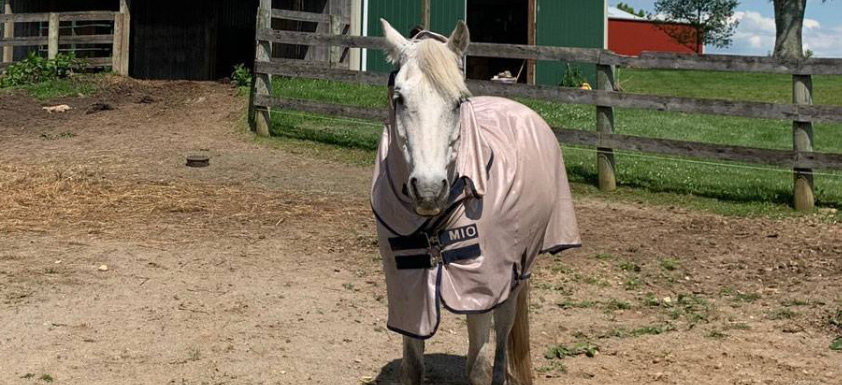
by Kentucky Equine Research Staff
One of the most frustrating insects for horse owners is a midge identified as Culicoides. Tiny and prone to swarming, these midges, sometimes called no-see-ums or punkies, can be relentless in their biting, often leading to persistent skin wounds.
Midges seem to prefer certain regions of the horse, including the mane, tail, and belly. Bites incurred by midges are sufficiently annoying, but the problem extends beyond mere aggravation. Many horses are allergic to the saliva of insects, creating areas of pruritis, or intense itching. Infected horses will use fixed objects such as fence posts, stall walls, or trees to scratch their manes and tails. Clever horses will straddle automatic waterers so they can relieve the discomfort on their bellies.
Aside from extreme itching, clinical signs of Culicoides-associated skin problems include broken hair or patchy hair loss, scaling, or oozing lesions. The lesions are often painful from the onset but become more so as they age. These symptoms are sometimes collectively referred to as sweet itch.
Treatment goals include controlling itchiness, treating secondary bacterial infections, and reducing exposure to midges. Because midges are most active just prior to and at dusk, one approach to reducing exposure would be to bring horses into a stall with a heavy air current, which is possible through the use of fans. Consultation with a veterinarian is always wise when confronted with a skin problem, and many horses with infection will require medication.
From a nutritional perspective, supplementation with omega-3 fatty acids is helpful.
“Many veterinarians and horse owners believe that daily supplementation with an omega-3 supplement helps tremendously with the itchiness and inflammation involved in Culicoides-related skin disease,” said Catherine Whitehouse, M.S., a nutrition advisor with Kentucky Equine Research (KER). “Omega-3s help control body-wide inflammation, and this might be one reason horses find a certain measure of relief when fed long-chain fatty acids.”
Fish oils are direct sources of eicosapentaenoic acid (EPA) and docosahexaenoic acid (DHA), which are the most useful omega-3 fatty acids in terms of conferring health benefits. For optimal omega-3 supplementation, choose a marine-derived product, such as EO-3.
Reprinted courtesy of Kentucky Equine Research. Kentucky Equine Research is an international equine nutrition, research, and consultation company serving horse owners and the feed industry. Our goals are to advance the industry's knowledge of equine nutrition and exercise physiology, apply that knowledge to produce healthier, more athletic horses, and support the nutritional care of all horses throughout their lives. Learn more at Kentucky Equine Research.
There a more informative articles in our section on Health & Education. While you're here be sure to visit our Curated Amazon Store.

































